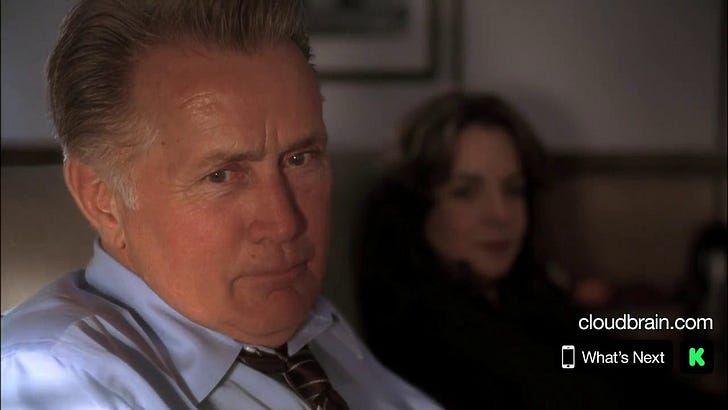What’s Next? Embracing Imperfection and Moving Forward
What The West Wing can teach us about self-compassion
I often notice how much we get stuck in judgment of our current experiences. For the folks I work with, it can sound like, “I had a hard meal, and I feel like I lost control.” or “I spent all day hating my body. I feel like I failed. Now everything is ruined. Maybe I’m not able to do this kind of work. Maybe I should give up.” Don't we all find the feeling of failure incredibly persuasive and hard to sit with?
Cliché Alert: Eating disorder recovery is not linear. Neither is body image healing or grieving. It’s all-or-nothing thinking: if I did it wrong, then I am wrong, and vice versa. The only linear thing is… a line.
As we move forward, we will undoubtedly have good moments and hard moments. It’s totally normal and part of this process.
If we accept that there will be struggles, we can permit ourselves to move on when they occur instead of dwelling on what we did wrong or how this happened. Yes, it’s easier said than done. We all struggle with the ability to pause and find a kinder, more compassionate way to talk to ourselves. This is where the idea of “What’s Next?” applies. Let me tell you how I started to think about the concept of “What’s Next?”
Story Time
If you know me, you know that I love Star Wars, but a close second is my love for The West Wing. Throughout the show, President Bartlet often says, “Ok, What’s next?” (See video below) It’s so common that the podcast about the show (yes, there’s a podcast about The West Wing, and yes, I’ve listened to it) signs off each episode with “Ok, Ok. What’s Next?” Maybe it’s just because of The West Wing, but as I think more, “Ok, What’s Next?” applies to this work.
What’s Next?
Our emotions can be overwhelming in the heat of a struggle, a challenging experience, or hard feelings. At the moment, our nervous system is all activated, and trying to process what’s going on isn’t accessible. Do we sit in shame and blame? Do we beat ourselves up for not being perfect? Do we spiral downward, leading to more struggles? Or do we create space for self-compassion? Can we embrace our imperfections and acknowledge that we may only be able to do C-level work?
The idea of doing C-level work is a valuable Body Trust™ theme. It suggests that we don’t need to get an “A” in our recovery or process, and we don’t need to get an “F,” either. What if we strive for a “C” and begin to give ourselves permission to not be perfect? We’ll discuss C-level work more in next week's vlog, so stay tuned.
Allowing those feelings to settle gives us more access to curiosity about the experience, enabling us to ask, “What’s next?” So, what if we focus on what's next instead of dwelling on that moment of struggle or behavior?
When we access self-compassion, we can accept the reality that recovery and navigating body image issues are incredibly challenging—perhaps some of the hardest things we’ll ever do.
Compassion and kindness for ourselves start with asking, “What’s next? I might not have handled that moment as best I could, but how can I continue to be kind to myself so the moment doesn’t turn into 10 or 15 moments?”
My Experience with What’s Next
I find asking “what’s next” to be immensely valuable. Diet culture and societal expectations of masculinity have taught me that I need to be perfect, to have my life together, and to provide for my loved ones. This mindset has made me hypercritical of myself when things go wrong and has led to unrealistic expectations for myself.
But if I can embrace my humanity, imperfections, and C-level work, I can ask myself, “What’s next?” Did I spend too much time worrying about my body or appearance? Maybe. But what’s next? Can I move on without letting it ruin my day?
When these moments happen, it’s easy for me to get stuck in my head. My partner, who supports me, will ask, “Can you rally?” I’m good at letting one setback ruin a day or week. When she reminds me to rally, it’s permission to feel angry, upset, or disappointed and to hold space for all the other feelings. We can feel complex emotions without letting them dictate our entire day.
What if we don’t let hard feelings ruin our day? What if we embrace our humanity and our flaws? What if we say, “That wasn’t my finest moment. I could have handled that differently, but ok, what’s next?”
Tell me what you think. How have you learned to move on from challenging moments? How have you embraced C-level work? How would you apply “What’s Next?” in your life? Most importantly, who is your favorite character from The West Wing?


